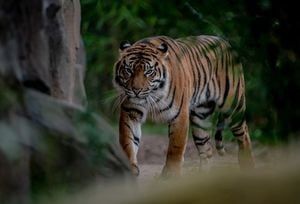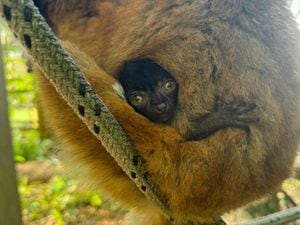WATCH: Tiny twin tigers born at Chester Zoo a 'cause for real celebration'
Hidden cameras have captured a first glimpse of two rare Sumatran tiger cubs born at Chester Zoo.

The tiny twins were born to first-time parents Kasarna and Dash on January 7. The new family has since been bonding in their den, with all of their adorable early life antics caught by the zoo’s CCTV cameras.
Zookeepers say the new arrivals are yet to be sexed, and will be named once they start to gain in confidence and venture outside, which experts estimate will be in early April.
Mike Jordan, director of animals and plants at the zoo, said: "The news is cause for real celebration among the global conservation community."
Just 350 Sumatran tigers are thought to remain in the wild, making them one of the world’s rarest tiger subspecies.
They are listed as critically endangered by the International Union for the Conservation of Nature (IUCN) - the most severe conservation category and highest priority.
According to carnivore experts, the birth is a significant step forward for the conservation breeding programme working to save the species from extinction.
Dave Hall, carnivore team manager at Chester Zoo, said: “We’ve been closely monitoring Kasarna on our CCTV cameras as she get to grips with motherhood and her first litter of cubs – it’s a real privilege and incredibly special to watch.

"She’s a great mum and is being very attentive to her new infants, keeping them snuggled up in the den and feeding them every few hours.
"It won’t be too long until they gain enough confidence to start venturing outside for the very first time as a family, which is really exciting.
"The birth of two more healthy Sumatran tiger cubs is another significant step forward in the long-term efforts to protect these incredible animals.
"One day, the pair will hopefully go on to themselves make a vital contribution to the endangered species breeding programme, which is now playing a critical role in preventing these majestic animals from becoming extinct.”
The expansion of unsustainable palm oil and coffee plantations has seen more than 90 per cent of the Sumatran tiger's habitat wiped out, bringing tigers into close conflict with the human population.
As a result, the carnivores are more exposed and often killed when they come into contact with villagers, farmers or livestock.
The species is also heavily poached for its skin, bones and canine teeth, which are sold illegally on the traditional Asian medicine markets.





